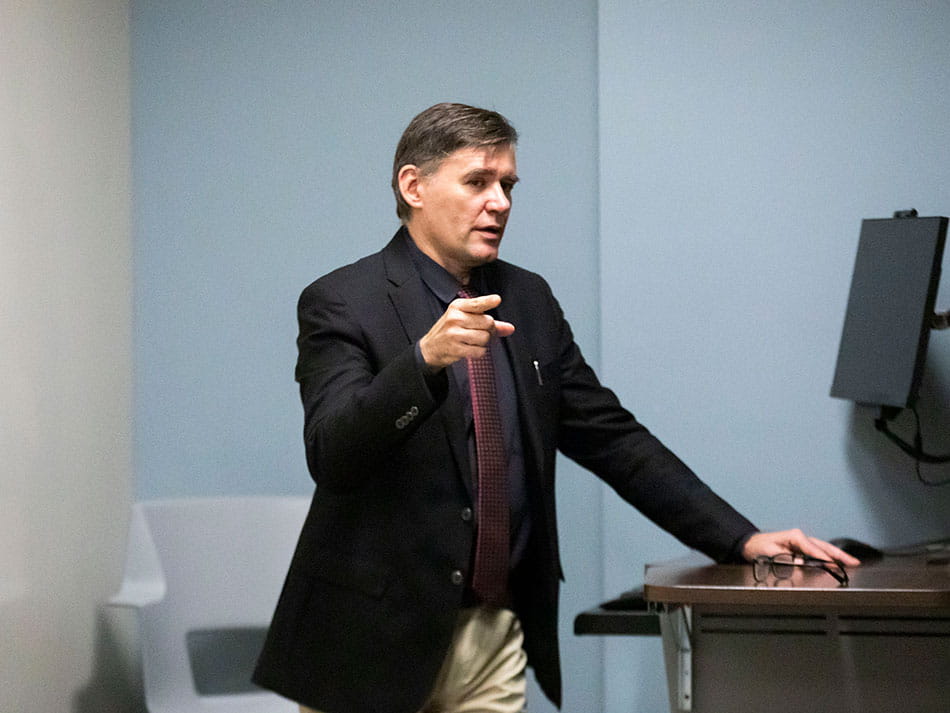This year, one Endicott professor took a different kind of summer break. One that involved closed-door diplomatic talks, meetings with government officials, and hard-hitting interviews with the press.
On June 19, Russian Federation President Vladimir Putin made his first visit to Pyongyang in 24 years, cruising through the capital in Russia's presidential state car, the luxurious Aurus Senat, with North Korea’s Supreme Leader Kim Jong Un riding shotgun.
The ride-or-die analogy was clear.
The leaders also signed a strategic partnership pact between Russia and North Korea, which included, most notably, a clause in which the countries pledge a mutual defense commitment “in case any one of the two sides is put in a state of war by an armed invasion from an individual state or several states.”
When the treaty was announced, Vitaly Kozyrev was already on a plane to Seoul for a series of public and closed-door lectures and media appearances. The Distinguished Professor of Political Science and International Studies said that the meeting between world leaders signified far more serious diplomatic business than a photo op.
Kim told reporters that the treaty created momentum towards “a new multipolar world,” one in which the United States, which had just armed Ukraine with powerful rockets, was an adversary.
“Given Putin’s recent visit to North Korea, there was great interest among Korean politicians and experts as well as U.S. personnel when I arrived on June 23,” Kozyrev said.
As an expert in great power politics, geopolitical risk, and international conflict, he not only offered up-to-the-moment analysis of rising alliances and tensions but also gathered real-time insight into Korean peninsula relations which would never have been graspable by Googling from his office on campus.

“From the beginning, I’ve always had one foot in academia and the other in diplomacy,” he explained.
Kozyrev grew up in Russia during the height of the USSR. Education unlocked doors for him. A natural talent for languages led to a career in Chinese translation and a ticket beyond the dictatorship’s borders to support high-profile government delegations traveling to China.
Following visiting fellowships at Taiwan’s Feng Chia University, Amherst College, and Yale University, Kozyrev came to Endicott and found his home. He also became a U.S. citizen in 2017.
The professor’s whirlwind itinerary in Seoul began with a meeting with the New York Times Korea Bureau Chief Choe Sang-Hun to informally discuss China-Russia-Korea relations, followed by speaking at a closed-door expert roundtable discussing the changing power dynamics in Northeast Asia at the Asan Institute for Policy Studies.
“Later that week, I visited the U.S. military base headquarters in Seoul, where I met with the commander and some U.S. Army experts on North Korea,” Kozyrev explained. “Then I visited the Korea National Diplomatic Academy, where I presented the implications of the Ukraine war for northeast Asia and the challenges posed by deepening trilateral cooperation between the DPRK, China, and Russia.”
He finished his trip by visiting the U.S. embassy, where he delivered a two-hour lecture for the U.S. diplomats working in Seoul. Next, he gave a talk at the Korea Institute for Defense Analyses and an interview with a reporter at the Korea Daily newspaper.
A prodigious writer, Kozyrev pulled together insights from the latest news into a widely read opinion piece published in July: The U.S. Needs to Fully Realize the Strategic Significance of a New Russia-North Korea Pact.
Inside he cautions, “The Russia-North Korea pact can be regarded as the result of a broader strategic agreement between Moscow, Beijing, and Pyongyang, which are united by the common idea of balancing against American hegemony and even sidelining the U.S., reducing the role of the American factor in the formation of a new joint security architecture in Eurasia.”
Kozyrev’s courses come alive for students as he brings this rich, on-the-ground knowledge back to his Endicott classroom.
“At the core of every one of my classes is the goal of connecting theory with practice,” Kozyrev said from his office. On his desk is the nearly completed manuscript of his forthcoming book, The New Cold War at Sea, co-authored with Brown University’s Director of the China Initiative Lyle J. Goldstein, and slated to be published by the Naval Institute Press.
“At Endicott, we challenge ourselves by learning more about what the rest of the world thinks about America and how to examine reality from different global perspectives,” said Kozyrev.


